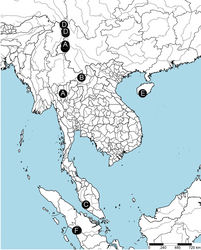Coddingtonia erhuan
| Notice: | This page is derived from the original publication listed below, whose author(s) should always be credited. Further contributors may edit and improve the content of this page and, consequently, need to be credited as well (see page history). Any assessment of factual correctness requires a careful review of the original article as well as of subsequent contributions.
If you are uncertain whether your planned contribution is correct or not, we suggest that you use the associated discussion page instead of editing the page directly. This page should be cited as follows (rationale):
Citation formats to copy and paste
BibTeX: @article{Feng2019ZooKeys886, RIS/ Endnote: TY - JOUR Wikipedia/ Citizendium: <ref name="Feng2019ZooKeys886">{{Citation See also the citation download page at the journal. |
Ordo: Araneae
Familia: Theridiosomatidae
Genus: Coddingtonia
Name
Coddingtonia erhuan Feng & Lin, 2019 sp. nov. – Wikispecies link – ZooBank link – Pensoft Profile
Type material
Holotype ♀, paratypes 5♀ and 1♂ juv. (NHMSU) CHINA: Yunnan Province, Gaoligongshan, the west of Nujiang River, Shibali Village, 27°08.28'N, 98°49.34'E, ca. 1850 m, 19 Aug. 2018, Y. Lin et al. leg.; Two paratypes 1♂ juv. and 1♀ used for sequencing, same data as preceding, GenBank: MN211319 and MN211318.
Other material examined
2♀ (NHMSU) CHINA: Yunnan Province, Gongshan County, Sijitong Village, on the banks of Nujiang River, 8°03.27'N, 98°35.76'E, ca. 1620 m, 12 Aug. 2018; 1♀ (NHMSU) CHINA: Yunnan Province, Longling County, Mangkuan Town, Baihualing Village, Zaotang River, subtropical broadleaf forest, 25°18.27'N, 98°48.04'E, ca. 1640 m, 21 Aug. 2018; 2♀ (NHMSU) CHINA: Yunnan Province, Longling County, Longjiang Town, Xiaoheishan Nature Reserve, Gucheng Hill, broadleaved deciduous forest, in surface leaf litter, 24°49.73'N, 98°45.55'E, ca. 2010 m, 22 Aug. 2018; 2♀ (NHMSU) CHINA: Yunnan Province, Gongshan County, the road of from Bingzhongluo Town to Puhuasi Temple, broadleaved deciduous forest litter, 28°01.42'N, 98°36.13'E, ca. 1870 m, 12 Aug. 2018, Y. Lin et al. leg.; 1♀ (NHMSU) CHINA: Yunnan Province, Fugong County, Shangpa Village, broadleaves deciduous forest, 26°53.66'N, 98°51.16'E, ca. 1470 m, 2 Jul. 2016, Y. Li leg.
Etymology
Formed from the Chinese words for two (èr 二) and circle (huán 环), referring to the paired loops of copulatory ducts (Fig. 4E); noun.
Diagnosis
This new species can be distinguished from other congeners by the 2 coils of the unilateral copulatory ducts around the spermathecae (Fig. 4E–F).By having a posterior tubercle on the abdomen (Fig. 4A–C) it differs from C. huifengi sp. nov. (Fig. 2A–D), C. anaktakun and C. discobulbus (Labarque and Griswold 2014[1]: figs 5A–C, 6A–C, 7A–C).
Description
Female (holotype): Carapace pear-shaped, black. Sternum tan. Legs dark brown. Abdomen obovate with posterior tubercle, dark black, ventrally darker than dorsally, covers sparse setae (Fig. 4A–C). Measurements: Total length 1.66. Carapace 0.62 long, 0.60 wide. Clypeus 0.14 high. Sternum 0.37 long, 0.38 wide. Abdomen 1.21 long, 1.04 wide. Length of legs: I 2.03 (0.65, 0.25, 0.43, 0.39, 0.31); II 1.80 (0.55, 0.23, 0.38, 0.34, 0.30); III 1.39 (0.42, 0.18, 0.26, 0.28, 0.25); IV 1.78 (0.55, 0.23, 0.40, 0.34, 0.26).
Epigyne (Fig. 4D–F): plate weakly sclerotized, nearly rectangular, with an indistinct central pit and pair of posterolateral pockets. Spermathecae barely visible through the integument; lateral wings well developed, with sclerotized glandular ducts in the dorso-medial; spermathecae globose, closely spaced and almost adjacent; copulatory ducts form a half loop in the ventral later wings, followed by 2 complete loops surround the spermathecae, and finally connect to the spermathecae (Fig. 4E); fertilization ducts short and twisty, arise from the dorsal side of spermathecae (Fig. 4F).
Male. unknown.
Distribution
Known only from the type locality (Fig. 6).
Original Description
- Feng, C; Lin, Y; 2019: Three new species of the genus Coddingtonia from Asia (Araneae, Theridiosomatidae) ZooKeys, 886: 113-126. doi
Images
|
Other References
- ↑ Labarque F, Griswold C (2014) New ray spiders from Southeast Asia: the new Philippine genus Tagalogonia gen. nov. and continental genus Coddingtonia Miller, Griswold and Yin, 2009 (Araneae: Theridiosomatidae), with comments on their intergeneric relationships. In: Williams G Gosliner T (Eds) The Coral Triangle: The 2011 Hearst Philippine Biodiversity Expedition.California Academy of Sciences, San Francisco, 407–425.


